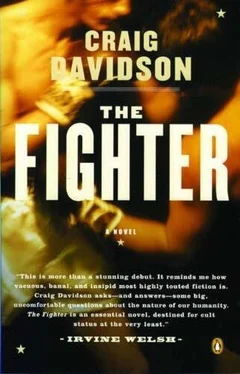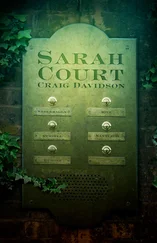“Son, oh son of mine.”
Jack Harris stepped into the office. He paused in the doorway, a framed daguerreotype: tall and thickly built, dressed in a suit that hung in flattering lines, jaw and cheeks ingrained with a blue patina of stubble.
He tapped the Rolex Submariner strapped to his wrist. “Make sure the damn thing’s still ticking,” he said. “Or perchance you’re operating on Pacific Standard time, in which case you’re hours early and I applaud your dedication. But if, like me, your watch reads eleven-thirty, you, child of my loins, are late.”
It was laughable, the very suggestion that it mattered whether Paul arrived early, late, or at all. What was the point of his being there — were break-room coffee supplies running at dangerously low levels?
Paul removed the Ray Bans. “Extenuating circumstances.”
“Yee-ouch. That’s a beaut.”
Jack tilted his son’s head up and poked the blackened flesh with the tip of a blunt, squared-off finger.
Paul pushed it away. “Lay off, will you? I’m not a grape — don’t need to squeeze the juice out of me.”
“That’s a blue ribbon winner.” Jack set a haunch on the desk’s edge. “How’d it happen?”
“Fell down a flight of stairs.”
“Those stairs knock your teeth out, too? That’s one mean-spirited staircase; tell me where it is so I can avoid it.”
Jack, veteran of many a low-county barfight, was evidently unmoved by his son’s state. Sometimes a man needed to get out there and chuck a few knuckles — it was cathartic. Afterward the winner bought the loser a pint.
“You planning to see a doctor?”
Paul waved the question off. “I possess inner resilience. I am Zen.”
Jack nodded. “Well, it’s like they say in poker, son: can’t win them all, otherwise it’d be no fun when you did.”
“Who says I lost?”
Jack laughed. Over the years he’d developed what Paul thought of as his Businessman’s Laugh: boisterous and patently phony, it began as a Kris Kringle-ish chortle before segueing into an ongoing staccato hack that sounded like a Nazi Sten gun. Oooohohohoho-aka-aka-ak-ak-ak! His father turned it on and off at will, like a faucet. On those rare occasions when Paul found himself among businessmen with everybody’s fake laughs ricocheting off the walls, he got the feeling he was deep in the forest primeval surrounded by screeching monkeys.
Jack’s mirth subsided. “Well, if the other guy lost I guess the police’ll be showing up any minute now — you must’ve murdered him.”
“You’re a laugh riot.”
“Speaking of laugh riots, that client you showed around yesterday, did you say that bambino line — the dirty feet thing?”
“I guess.”
“Well then that was awful dumb. The guy’s Italian.”
“He say something?”
“Yeah, he said something — why’d I bring it up, he didn’t say something?”
Paul shrugged. “Some people like the joke.”
“Who, some people?” When Paul didn’t reply: “Idiots, that’s who. It’s a lead balloon.”
Paul was getting pointers from a man who trafficked heavily in knock-knock jokes and dried-up puns: Hey, did you hear about the guy whose whole left side was cut off? He’s all right now. Oooohohohoho-aka-aka-ak-ak-ak!
“Ah, what does it matter?” Paul wanted to know. “Some pissant buyer who owns a pissant boozer in Welland.” He snorted. “Who drinks wine in Welland? Grape juice cut with antifreeze is more like it. I fail to view it as a big loss.”
His father kept his gaze on the floor for several seconds before tilting his chin toward him. His eyes were a pair of hard wet stones.
“We exist but for the grace and patronage of our buyers. Whether it’s a hotel chain or a family-run restaurant, we treat them all with the same respect — you get me?”
Paul nudged his Ray Bans down over his eyes. “I get you.”
“Take those off while I’m speaking to you.”
Paul leaned back in his chair and knitted his hands behind his head.
“Take those … off ”
Paul took the sunglasses off. “There. Satisfied?”
Jack’s expression attested he wasn’t at all satisfied. “Now tell me: who do we work for?”
“Oh, come off it.”
“Who do we work for?”
“The buyer.”
“You got it, Pontiac.”
They stared at each other across the desk. Paul saw a man who had never grown into his wealth; a man who’d never forget how his feet looked stained with newspaper ink. What did Jack see? Perhaps something he couldn’t quite reconcile: his own flesh and blood, yet at the same time a deeply mystifying creature who stood outside his understanding. A son who’d been given everything — higher education, a life of the mind — and yet frequently struck him as frail and useless. And while he loved Paul deeply, Jack couldn’t help but think this was not at all the son he’d envisioned.
“How was your date last night?”
“How do you figure?”
“That Faith is pretty sweet, isn’t she? Her dad’s done well for himself. She’ll inherit quite a fortune.” Jack lowered his voice on the last word, as though he were detailing some seductive quality of her physique. “Nice ass, too.”
Paul groaned. “Don’t talk to me about her ass.”
“Take a bite out of it, like a juicy apple — rowf !”
“Oh, my … god.”
Jack chuckled, easing himself off the desk. “Ah, come off it — your old man’s married, not dead.” He frowned. “Get your damn teeth fixed, will you?
Look like you ought to be offering hayrides through Appalachia.”

The offices connected to the distillery down a stone corridor.
Paul walked down rows of gleaming steel tanks. Back in high school he’d snuck in here with his buddies; they tapped the spigots and guzzled Merlot until their teeth were stained the color of mulberries before stumbling out into the vineyard to reel through the darkened rows. The evidence was damning — smashed glasses on the distillery floor, vines trampled by clumsy drunken feet — and surely his father had known, but his only comment was that the Angel’s Share had been uncommonly high those seasons.
A door gave onto a small portico overlooking the vineyard. In the summertime it was a spectacular view: vines unfurling over the gullies and rises in lines planted straight as the hairs on a doll’s scalp. On early spring nights you could actually hear them growing: a faint creaking like worn leather stretched over a pommel.
A group of men moved along the trellis lines at the vineyard’s far edge.
Every spring Paul’s father hired a crew of Caribbean fieldworkers. He wasn’t the only one: most Niagara wineries hired crews from Jamaica, Cuba, Haiti, Ecuador, supplementing this core with university students who were generally shiftless and unreliable, prone to begging off on sunny days better spent at the beach.
Paul once accompanied his father to Pearson airport to pick up a crew of pickers. They’d shared the Arrivals lounge with the owners of several local wineries, and as the pickers disembarked, calls of Pillittieri crew, here! and Stonechurch, over here! rang out while the workers stood around, dazed and jet-lagged, trying to recall the name of the winery that had hired them.
Today they were picking frozen grapes for ice wine. Winemakers waited until frosts hardened the grapes into withered purple pellets before harvesting.
“I thought you guys might like some help,” he told them.
Nervous glances passed between the pickers. The owner’s kid standing there in his eight-hundred-dollar suit. Was he joking? White folks had such an odd sense of humor.
Читать дальше













